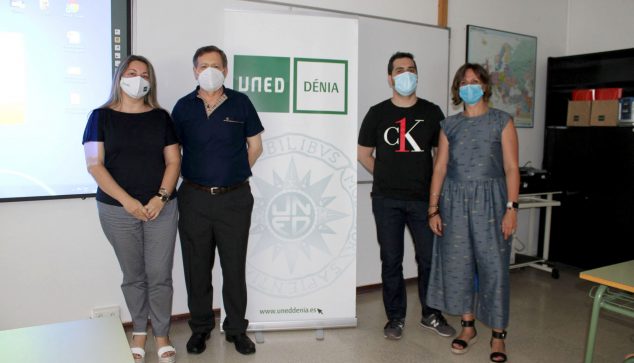Yesterday he finished the course "Unraveling the Addicted Brain" organized by the CA UNED Dénia which has been attended by more than 140 people in person, online and deferred.
Addiction is a chronic and recurring disease that affects the brain and is characterized by a pathological search for reward through the use of a substance or other behaviors.
During the course, the different presentations and conferences have had the objective of revealing the functioning and mechanisms that lead to the formation, evolution and chronification or overcoming of an addiction, as well as the different substances and activities that are more likely to lead a human being to the same.
The course, sponsored by the Dénia City Council and which has had the collaboration of the CA UNED Dénia Observatory for Equality, was presented by Ms. Raquel Martí Signes, Director of the CA UNED Dénia and Mr. Jaume Tortosa, Secretary of the CA UNED Dénia and Coordinator of University Extension.
Raquel Martí, after presenting the course, expressed his satisfaction with the great reception the course has had, highlighting that UNED Dénia continues to offer training, culture and education, facilitating equal opportunities in the two regions of the Navy, thanks to the collaboration of the Governing Board, which makes it possible. Jaume Tortosa also showed his pride and satisfaction, especially for the strong commitment made in a context such as that of COVID-19.
The first day was opened with the presentation "Presenting the addicted brain" by D. Alejandro Higuera Matas, Professor of Psychobiology at UNED. Alejandro Higuera made a complete exposition of the human nervous system, later delving into the specific problem of addictions, highlighting that, according to several studies, approximately 15% of people who use drugs become addicted.
The morning continued with the conference "Food as a drug of abuse" by Ms. Nuria del Olmo Izquierdo, Professor of Psychobiology at UNED who, after delving into the concept of substance addiction, went into food addiction, exposing that the consumption and the particular use of certain foods awaken in some people the same addictive behavior and behaviors as drugs of abuse.
During the morning of the second day, two presentations took place: "The brain and addictions" by Marta Ruipérez Alonso, Professor-Tutor Centro Asociado UNED Dénia, who explained how the addiction process works as well as the effects caused by the various chemical substances in the brain, the effects caused by technological stimuli, and the behaviors associated with addiction; and the presentation "Mental stimulation as a legal substance to improve sports performance" given by Miguel Ángel Martínez Ramos, Elite Athlete who stressed that "What makes a good athlete become a number one is his mental strength."
The afternoon was dedicated to the conference "New psychoactive substances" by Emilio Ambrosio Flores, Professor of Psychobiology at UNED, where the concept of New Psychoactive Substances was discussed and where Emilio Ambrosio Flores highlighted that "These new psychoactive substances are drugs whose composition chemistry we do not know well and, for that reason, we cannot find out what kind of effects they are going to have on organisms and in that sense they are dangerous ”.
The second day ended with the presentation "At the intersection between schizophrenia and addiction" by Roberto Capellán Martín, Postdoctoral Researcher at the Department of Psychobiology at UNED, where prenatal infections and traumatic experiences around puberty were discussed as risk factors for the development of schizophrenia in adulthood, especially in men.
On the third and last day of the course, two conferences took place: "A look through the grass: adolescents and marijuana" by Alejandro Higuera Matas, Professor of Psychobiology at UNED, where special emphasis was placed on adolescence as a complex period and that he is highly vulnerable, especially since his brain is still developing; and the conference “And to finish… shall we have a drink? Alcohol addiction ”by Nuria del Olmo Izquierdo, Professor of Psychobiology at UNED. At the conference, Nuria del Olmo emphasized how premature exposure to alcohol can produce lasting changes in the functions of the central nervous system that can alter cognitive processes in later stages of life.
The course has had the wide participation of the students who have asked numerous questions, both face-to-face and virtual, and where the importance of information and knowledge of the brain to prevent and treat addiction has been verified.
Registration is still open for the summer course "Music in the key of PSI: Psychology and Music", from July 27 to 29, and can be done in person, online and on a delayed basis.
Open the enrollment period between July 7 and October 22 for the 28 Degrees, 11 Combined Degrees, 79 Masters and Access to University at CA UNED Dénia and its classrooms Xàbia and Benidorm.







